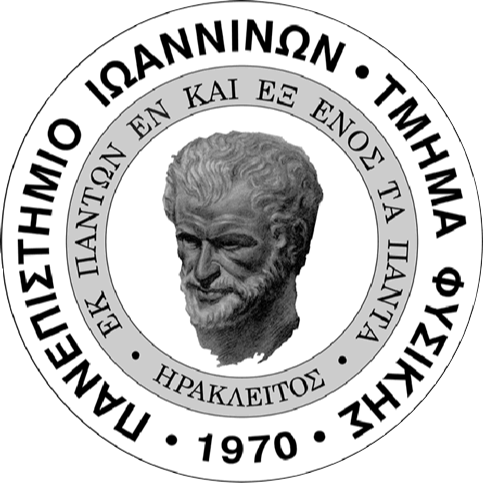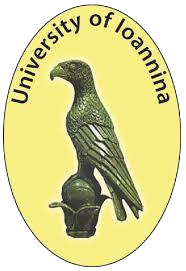
Personal Information
(+30) 26510 - 08451
l.c.kazantzidis@gmail.com
lawrence.kazantzidis
Lavrentios Kazantzidis
Personal Website
Research Interests
My main research interests include theoretical and astrophysical aspects of cosmology, modified gravity theories (extensions of General Relavity), as well as cosmological data analysis.Short Curriculum Vitae
Education
2017 – 2022 Ph.D. in Physics
Thesis Title: “Cosmological Implications of Scalar Tensor Theories”
Department of Physics, University of Ioannina
2015 – 2017 Postgraduate Studies (M.Sc.) in Physics
Graduated with an overall grade 8.44/10.00
Department of Physics, University of Ioannina
2011 – 2015 Bachelor of Science certificate (B.Sc.) in Physics
Graduated with an overall grade 7.47/10.00
Department of Physics, University of Ioannina
Scholarships/Grants
2021 – Present Tilted Cosmology
Role: Partner
Funding Source: Hellenic Foundation of Research and Innovation (HFRI) – “1st Call for Hellenic Foundation for Research and
Innovation Research Projects to support Faculty members and Researchers and the procurement of high-cost research equipment”.
2018 – 2021 Cosmological Aspects of Modified Theories of Gravity
Fellow of the Greek State Scholarships Foundation (IKY) for Ph.D. Studies.
Computer Skills
Operating Systems Windows & Linux
Programming C & Wolfram Mathematica
Scientific Software (MG)CAMB, (MG)COSMOMC, CLASS, MontePython, LaTeX
Languages
Greek Native
English First Certificate in English (FCE)
Examination for the Certificate of Competency in English (ECCE)
French Diplôme d’études en langue française (DELF) B1
Collaborations
2021 – 2022 Snowmass2022
2017 – 2021 Cosmology and Astrophysics Network for Theoretical Advances and Training Actions (CANTATA)
Peer Review
Societies
2018 – Present Junior Member of the Hellenic Society on Relativity, Gravitation and Cosmology
Publication Record
For the full list of my publications please visit the inspirehep database.
Cosmology Intertwined: A Review of the Particle Physics, Astrophysics, and Cosmology Associated with the Cosmological Tensions and Anomalies
E. Di Valentino et al., Contribution to the 2022 Snowmass Summer Study
JHEAp 34 (2022) 49-211
DOI: 10.1016/j.jheap.2022.04.002
Observational constraints on the deceleration parameter in a tilted universe
K. Asvesta, L. Kazantzidis, L. Perivolaropoulos and C. G. Tsagas
Mon.Not.Roy.Astron.Soc. 513 (2022) 2, 2394-2406
DOI: 10.1093/mnras/stac922, Supplemental Material
Late-transition vs smooth H(z) deformation models for the resolution of the Hubble crisis
G. Alestas, D. Camarena, E. Di Valentino, L. Kazantzidis, V. Marra, S. Nesseris and L. Perivolaropoulos
Phys. Rev. D 105, 063538
DOI: 10.1103/PhysRevD.105.063538, Supplemental Material
A w – M phantom transition at zt<0.1 as a resolution of the Hubble tension
G. Alestas, L. Kazantzidis, L. Perivolaropoulos
Phys.Rev.D 103 (2021) 8, 083517
DOI: 10.1103/PhysRevD.103.083517, Supplemental Material
Hints for possible low redshift oscillation around the best fit ΛCDM model in the expansion history of the universe
L. Kazantzidis, H. Koo, S. Nesseris, L. Perivolaropoulos, A. Shafieloo
Mon.Not.Roy.Astron.Soc. 501 (2021) 3, 3421-3426
DOI: 10.1093/mnras/staa3866
H0 tension, phantom dark energy, and cosmological parameter degeneracies
G. Alestas, L. Kazantzidis, L. Perivolaropoulos
Phys.Rev.D 101 (2020) 12, 123516
DOI: 10.1103/PhysRevD.101.123516, Supplemental Material
Hints of a Local Matter Underdensity or Modified Gravity in the Low z Pantheon data
L. Kazantzidis, L. Perivolaropoulos
Phys.Rev.D 102 (2020) 2, 023520
DOI: 10.1103/PhysRevD.102.023520, Supplemental Material
Hints of modified gravity in cosmos and in the lab?
Leandros Perivolaropoulos, Lavrentios Kazantzidis
Int.J.Mod.Phys.D 28 (2019) 05, 1942001, Invited Review for Special Issue on Modified Gravity
DOI: 10.1142/S021827181942001X
Constraining power of cosmological observables: blind redshift spots and optimal ranges
L. Kazantzidis, L. Perivolaropoulos, F. Skara
Phys.Rev.D 99 (2019) 6, 063537
DOI: 10.1103/PhysRevD.99.063537, Supplemental Material
σ8 Tension. Is gravity getting weaker at low z? Observational evidence and theoretical implications
Lavrentios Kazantzidis, Leandros Perivolaropoulos
Invited contribution for the White Paper of COST CA-15117 project “CANTATA” (Cosmology and Astrophysics Network for Theoretical Advances and Training Actions) “Observational Discriminators” section.
DOI: 10.1007/978-3-030-83715-0_33, arXiv: 1907.03176, Supplemental Material
Consistency of modified gravity with a decreasing Geff (z) in a ΛCDM background
Radouane Gannouji, Lavrentios Kazantzidis, Leandros Perivolaropoulos, David Polarski
Phys.Rev.D 98 (2018) 10, 104044
DOI: 10.1103/PhysRevD.98.104044, Supplemental Material
Evolution of the fσ8 tension with the Planck15/ΛCDM determination and implications for modified gravity theories
Lavrentios Kazantzidis, Leandros Perivolaropoulos
Phys.Rev.D 97 (2018) 10, 103503
DOI: 10.1103/PhysRevD.97.103503, Supplemental Material
Experience
Teaching Assistance
Winter Semesters 2017 – 2022 Classical Electrodynamics I (5th Semester Core Course – 52)
Department of Physics, University of Ioannina, Greece
Spring Semesters 2020 – 2022 Cosmology (Advanced Undergraduate Elective Course – 105)
Department of Physics, University of Ioannina, Greece
Spring Semesters 2018 – 2019 Gravity and Cosmology (Advanced Graduate Elective Course – M122)
Department of Physics, University of Ioannina, Greece
M.Sc. Diploma Thesis
Title: Dark Energy from Generalized Gravitational Theories with a Time-dependent Newton’s Constant (scalar tensor theories).
Abstract: This work is focused on alternative forms of Dark Energy. The challenges that the ΛCDM model faces led to a variety of alternative models, such as extra dimensions, quintessence models, $f(R)$ extended gravity theories, scalar tensor quintessence models etc. The main goal of my master thesis is to investigate the cosmological dynamics for general scalar tensor quintessence field models. Firstly, we introduce the reader to the mathematical formalism of Standard Cosmology and then, we study alternative theories that can play the role of Dark Energy such as quintessence models based on linear-negative potentials of the form $V (\phi) = −s \, \phi$. In the second part of this work we review the scalar tensor quintessence field models and their theoretical background. We investigate the equation of state parameter $w(z)$ for these particular models and we use the Union2.1 dataset of 580 SnIa as a validity test and to explore the observational consistency of the theoretical model and its predictions for the fate of our Universe. Finally we study qualitatively different potentials of the form $V = s \, |\phi|^{n}$ and use, once again the Union2.1 dataset as a consistency test of our model.
You can see my full M.Sc. thesis here.
Ph.D. Thesis
Title: Cosmological Implications of Scalar Tensor Theories
Abstract: In this PhD dissertation we study the cosmological consequences of modified theories of gravity. Motivated by the theoretical and observational challenges of the concordance model ΛCDM, we use up to date cosmological data from both geometric and dynamical probes to constrain modified gravity theories and extract the relevant best fit parameters. In particular, we first introduce the reader to the mathematical formalism of standard cosmology and then focusing on one of the two major tensions that ΛCDM faces ($\sigma_8$ tension), we introduce a purely phenomenological parametrization for the evolving Newton’s constant $G_{\rm eff}$ and constructing an up to date compilation of growth data we extract its best fit parameters. Then, we study viable modified theories of gravities (such as f(R) and scalar tensor theories) in order to see if they have the potential to support the observed behavior the evolving Newton’s constant. Moreover, we examine other cosmological data (such as the low l cosmic microwave background data as well as the Pantheon compilation, i.e. the latest publicly available Type Ia supenovae compilation that is publicly available) to impose strong constraints on the phenomenological parametrization for $G_{\rm eff}$. Next, we study the constraining power (sensitivity) of a wide range of cosmological observables on cosmological parameters, showing that the sensitivity is actually a rapidly varying function of the redshift where the observable is measured and not a monotonically increasing function. In addition, we consider two late time gravitational transition dark energy models that have the ability to simultaneously tackle both the $H_0$ and growth problems and using the full cosmic microwave background data as well as some other up to date cosmological data, we obtain their quality of fit and compare it with the quality of fit provided by other well studied dark energy models that have been proposed as possible solutions in the literature as well as with the concordance model of standard cosmology. Finally, we study the impact of various modified gravity models in the sub-mm scales using the data of the Washington experiment.
You can see my full Ph.D. thesis here.



